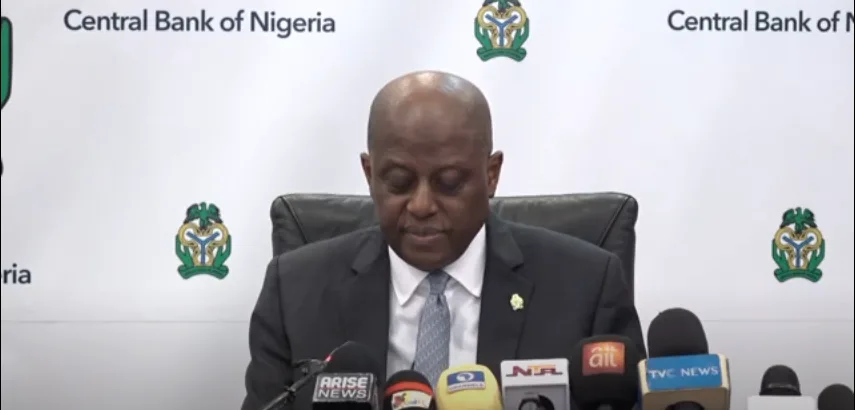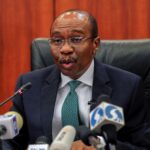The Central Bank of Nigeria (CBN) has further increased Monetary Policy Rate (MPR), also known as the benchmark interest rate by 50 basis points to 27.25 per cent.
Prime Business Africa reports that this is the fifth consecutive time of raising the benchmark interest rate this year by the CBN. Between February and July, the CBN raised the rate by 800 basis points.
Join our WhatsApp ChannelThe new rate reflects an 8.5 per cent increase in interest rates.
The apex also raised the Cash Reserve Ratio by 500 basis point to 50 per cent from 45 per cent.
READ ALSO: CBN To Hold 297th MPC Meeting Next Week
The CBN retained the asymmetric corridor around the MPR at +100/-300 basis points, cash reserve ratio (CRR) at 45 percent, and retained the liquidity ratio (LR) at 30 per cent.
The apex also raised the Cash Reserve Ratio by 500 basis point to 50 percent from 45 per cent.
This was announced on Tuesday, by the CBN Governor, Olayemi Cardoso, at the end of a two-day Monetary Policy Committee (MPC) meeting held in Abuja.
The monetary policy rate is the baseline interest rate that determines every other interest rates used within an economy. It determines the lending rates by commercial banks.
The central bank as a monetary authority saddled with the responsibility of price stability, uses the MPR as an instrument to tighten money supply and tackle inflationary pressure on the economy.
According to a communique signed by the CBN governor, the MPC members, however, retained the asymmetric corridor around the MPR at +100/-300 basis points and retained the liquidity ratio (LR) at 30 per cent.
The Committee noted the moderation in headline inflation year-on-year in July and August 2024 and the relative stability and convergence in the exchange rate across the various market segments, resulting from the CBN’s tight monetary policy stance.
“This is expected to improve confidence which will enable economic agents to plan in the medium to long term,” he stated.
The Committee also emphasised that a lot more needs to be done to actualize the Bank’s price stability mandate.
READ ALSO: CBN Limits Ways And Means Advances To 5% Despite National Assembly’s Proposal For Increase
The MPC noted that even though headline inflation has dropped for two consecutive months (July and August) due to a moderation in food inflation, core inflation has remained high, driven primarily by rising energy prices. The Committee expressed concerns about the uptrend, stressing that it clearly indicates the persistence of inflationary pressures.
“Members thus, reiterated the need to. work in close collaboration with the fiscal authority to address the current upward pressure on energy prices.”
Increasing Money Supply
The CBN boss added that the Monetary Policy Committee also noted the continued growth in money supply, emphasising the need to curtail excess liquidity in the system as well as address foreign exchange demand pressures.
The CBN governor further said that members also expressed concern about the growing level of fiscal deficit but acknowledged the commitment of the fiscal authority not to resort to monetary financing through Ways & Means.
The MPC also observed a strong correlation between releases by the Federation Accounts Allocation Committee (FAAC) and liquidity levels in the banking system as well as its impact on the exchange rate. “The Committee, therefore, agreed to increase monitoring of future releases with a view to addressing its effects on price developments,” the Cardoso stated.
Victor Ezeja is a passionate journalist with seven years of experience writing on economy, politics and energy. He holds a Master's degree in Mass Communication.















Follow Us